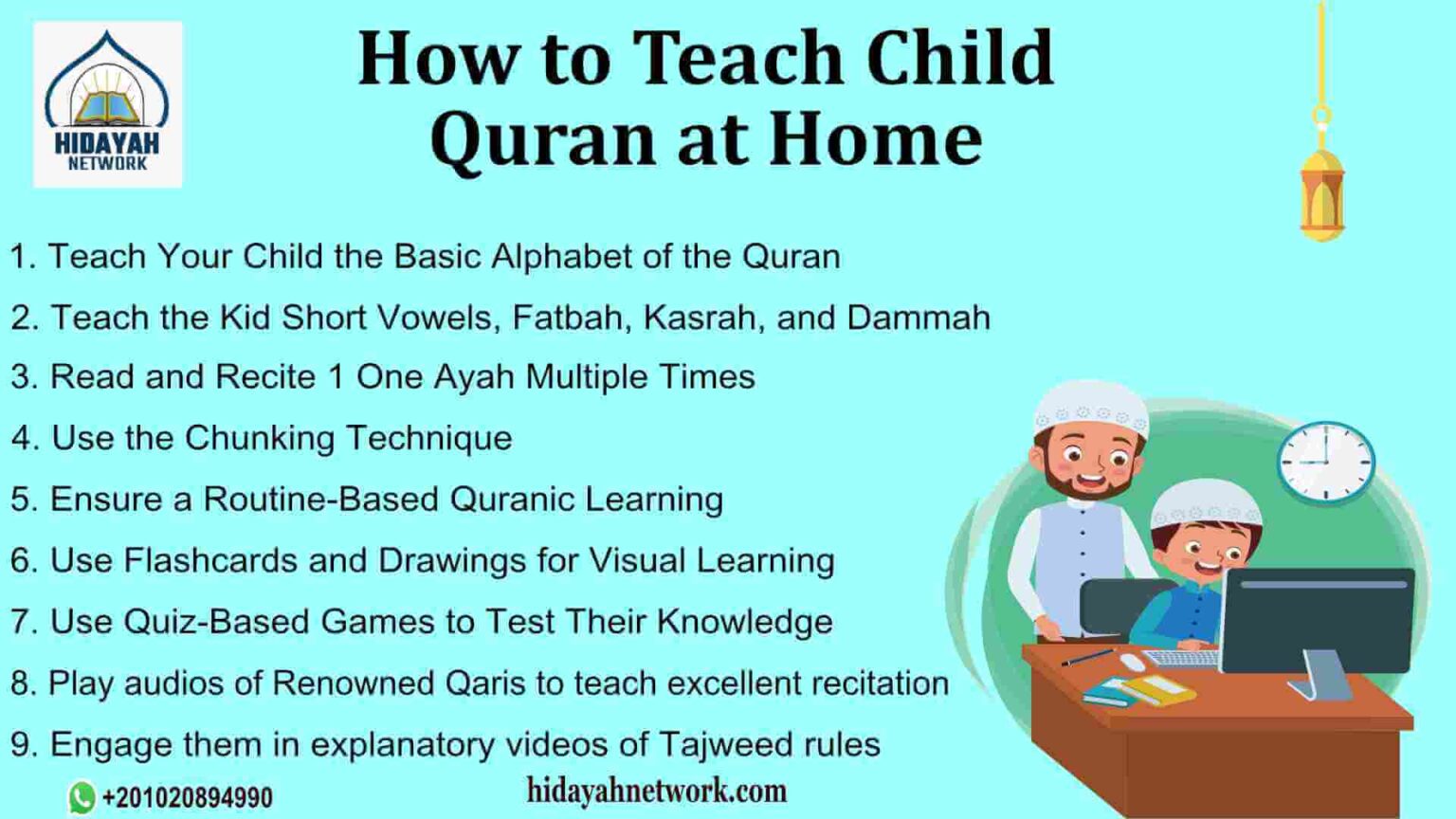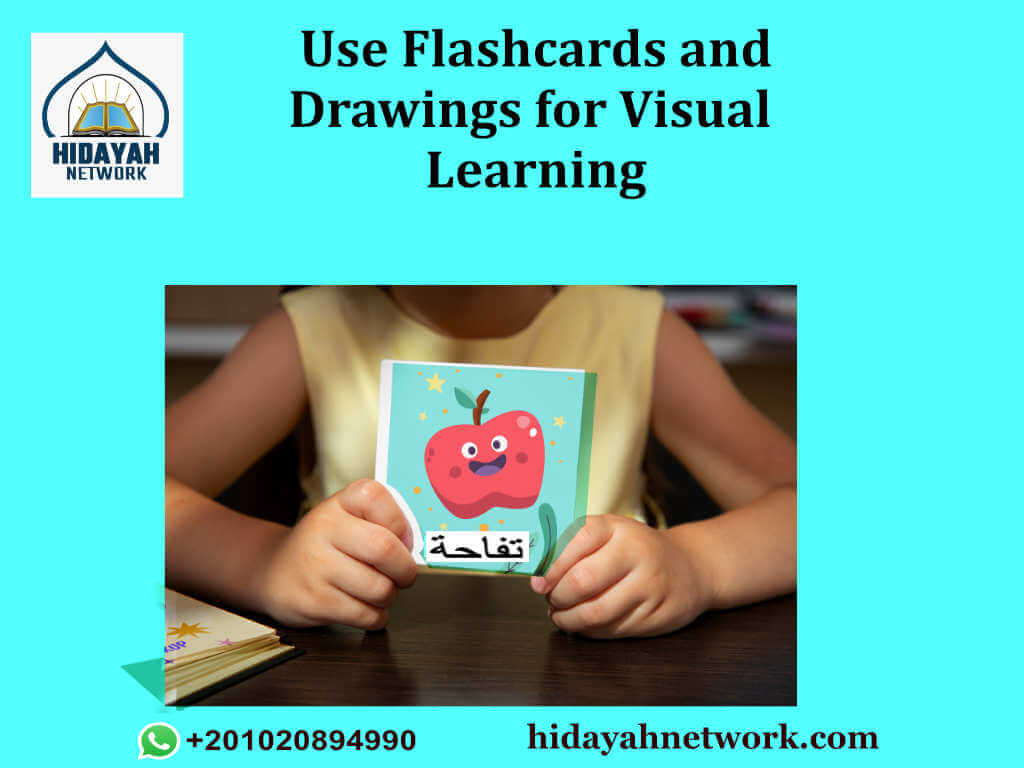How to Teach Child Quran at Home

- Hidayah
- Network
- | Role: Hidayah Network

Growing up, it’s vital to teach your child the Quran as a parent. This ensures that your child follows the righteous path and develops the early habit of reading and learning the Quran. Thankfully, there are effective tips and techniques to teach your child the Quran at home. These are proven and practical tips that will help your child to be motivated, enhancing their learning ability at a young age.
The best way to teach Quran to kids is to introduce them through age-appropriate and structured lessons. Start from the Arabic language basics to form a solid base and then move on to the next relevant phases step by step. So, how would you implement these techniques in those Quran classes for kids? That’s where you need our expert help. Stay with us until the end to ensure you teach your child the Quran in the best ways possible!
Table of Contents
Toggle10 Exciting and Practical Ways to Teach Your Child the Quran at Home
As we know there are lots of benefits of learning Quran at young age so here are some ways to teach children Quran at home.
1. Teach Your Child the Noorani Qaida
To introduce kids to the Quran at home, start with the comprehensive e Arabic learning through Nooranu Qaida. Children can learn these easy rules of Quran reading with enthusiasm. Use colorful and engaging resources like alphabet charts, flashcards, and games or quizzes for each rule. Create associations between the Arabic letters and familiar objects or words that your child already knows in their native language.
Work on the accurate makharij (pronunciation) because Quranic Arabic has its articulation points. You can expose them to interactive learning tools like animations and audio clips of letters to help them understand clearly. Use visual aids, worksheets, or interactive apps specifically designed to teach the rules of Noorani Qaida to kids. Engage them in practical example practice from the Quran. You can also search for Quran teaching methods and apply the best ones. It’s one of the ideal ways to learn Quran for beginners.
2. Teach the Kid Short Vowels, Fatbah, Kasrah, and Dammah
Once your child is familiar with the Arabic alphabet, introduce them to the concept of short vowels – fathah (َ), kasrah (ِ), and dammah (ُ). Explain that these marks change the way words are pronounced and help in Quranic recitation. For instance, show them how “كَتَبَ” (kataba) with a fathah on the ‘kaaf’ sounds like ‘ka-ta-ba.’
Use visual aids, worksheets, or interactive apps specifically designed for teaching Arabic phonetics to kids. Engage in pronunciation practice and encourage them to recognize and differentiate these vowel sounds in simple Quranic words, instilling the importance of correct pronunciation right from the beginning.
Get 40% OFF Now!
3. Read and Recite 1 One Ayah Multiple Times
To keep children engaged while teaching the Quran at home, select a short and meaningful ayah (verse). Repeat it several times during a session.
For instance:
Take Ayat-ul-Kursi (verse 255 of Surah Al-Baqarah) and discuss its significance. Then, read it together, encouraging your child to recite after you. Reinforce the idea that this verse is special and has a lot of value in Islam. You can even make a game out of it, asking your child to recite it from memory each day, with a small reward as an incentive. This repetition not only aids in memorization but also connects your child to the Quran on a personal level. You will also require a home education environment that must allow kids to sit and focus on what they are learning. Quran learning at home must be made very interesting and easy-going for juniors.
4. Use the Chunking Technique
When your child is ready for longer Quranic passages, employ the chunking technique to make learning more manageable.
For Example
Take a passage from a surah, like Surah Al-Balad, and break it into small, digestible parts. Start with the first few lines, and once your child has grasped those, move on to the next section. As you go along, connect the pieces to form the complete surah.
The beauty of this technique is that it allows your child to experience a sense of accomplishment with each ayah learned, building confidence and motivation.
It’s a practical way to ensure consistent progress while keeping the learning experience enjoyable for them. Look for some memory enhancement techniques that will surely help your toddlers retain what they are learning/understanding and memorizing.
5. Make a regular Routine of reading Quran
Consistency is mandatory when teaching your child the Quran at home. Establish a daily or weekly routine for Quranic learning. Set aside a specific time each day, whether it’s after school, before bedtime, or during weekends. Having a routine helps children understand that Quranic learning is a regular and important part of their day.
Designate a quiet and comfortable learning space and ensure no distractions during this time. This routine-based approach also provides parents with a structured way to track their child’s progress and adapt the learning process as needed. Joining Quran classes foe beginners is best to make children routine to learn and understand the quran at a young age.
6. Use Flashcards and Drawings for Visual Learning

Visual aids are excellent tools for teaching the Quran to kids at home. Create :
- Colorful flashcards with Arabic letters, words, or short verses. These cards can include simple drawings or images to help children connect the visual elements with the Quranic text.
- Use animations, drawings, and sign language for different themes of Surahs. Toddlers will get a hint from these resources and enjoy learning.
For example:
You can have a flashcard with the word “شَمْس” (shams), accompanied by a drawing of the sun. This visual reinforcement makes learning more engaging and memorable for children, particularly those in kindergarten.
7. Use Quiz-Based Games to Test Their Knowledge

To make Quranic learning easy for children, incorporate quiz-based games into your teaching approach and break the monotonous class-like learning routine.
Create simple, age-appropriate quizzes that test their knowledge of:
- Arabic letters
- Qaida rules
- Quranic vocabulary
- And short surahs.
For instance:
You can make a game where you call out an Arabic letter, and your child needs to find it on a chart or flashcard.
Alternatively, use a quiz format to ask questions about the meanings or pronunciations of specific Quranic words.
These interactive games not only make learning fun but also assess your child’s progress effectively, providing immediate feedback and motivating them to improve their Quranic knowledge.
8. Play audios of Renowned Qaris to teach excellent recitation
After you teach basic reading skills to kids, the next phase is to polish their recitation to let it match the higher standards set by native Arabs. Here are some suggestions to follow:
- Let them listen and imitate the tone of different Qaris reciting the Quran.
- Appreciate them to recite at a higher pitch to maintain the flow of the voice and improve the clarity of words.
- Expose them to breath exercises to develop a strong grip on elongations, stretches, and pauses in recitation
- Recite each Surah with proper tajweed thrice. This will help practice rules and polish Qira’a.
9. Engage them in explanatory videos of Tajweed rules
Teaching through explanatory videos and animations has a significant impact on children. Parents can easily search the topics related to Quran learning on various famous websites and download videos they think are helpful.
- Play the video and give your kids time to watch. Help them if required.
- Ask short questions regarding the video.
- Give them a quiz test or riddles based on the newly learned topic.
10. Create a joint family Quran learning session
Be mindful that homeschooling needs a proper learning environment where the whole family has to be very active, motivated, and consistent.
For Quran teaching, all the members of the family must participate in a discussion to encourage and engage kids.
What is the easiest way to learn Quran at home
The easiest way to learn Quran at home is:
✔️To hire an online tutor for your little ones.
✔️Devise a plan for them to follow weekly or twice a week.
✔️Keep a record of their progress to ensure accurate learning.
✔️Other than that, parents can teach Quran to kids if they are knowledgeable and well-read in Quranic studies.
How can I connect my child to the Quran
Parents can connect their children to the Quran in these following ways.
- Read Quran daily to let them copy you and understand that it is necessary to read this book daily.
- Narrate interesting stories about Allah’s love and Mercy so that kids develop affection for the Lord.
- Talk about Allah, the Quran, rewards, and Prophets occasionally in your home so that your tiny ones grow up listening and associating with Allah.
- Appreciate prayer imitation from a very young age. This way kids will learn how to connect and talk to Allah through prayers.
How do I start teaching my child the Quran
If you want to teach Quran to your children by yourself, the best way is to follow this sequence:
- The basic Quran reading trough drills of Noorani Qaida
- Teaching Tajweed rules to perfect recitation. Introduce one rule at a time.
- Appreciating memorization of Quranic Surahs. Start from the last chapter as it has easy and short Surahs.
- Motivate them to offer prayer with you no matter how much they know by heart.
- Narrate Stories interestingly and deliver what you have planned to teach.
Teach Your Child the Quran with Experienced Quran Tutors
If you think your tajweed and Quranic knowledge lack proficiency, then, Hidayah Network offers an exceptional opportunity for kids to learn Quran online at home.
- With our experienced and dedicated online Quran tutors, your child will get an opportunity to acquire tailored and engaging Quranic education.
- Our network of tutors is skilled in teaching children of all ages, ensuring age-appropriate methods that make learning the Quran a fulfilling experience.
- They make sure children are learning Quran with the supporting study material based on activities, quizzes, riddles, cartoons, and documentaries.
Conclusion
Teaching your child the Quran at home can be a rewarding and transformative journey. By utilizing engaging techniques such as visual aids, routines, and interactive games, you can make Quranic learning an enjoyable and meaningful experience for your child. These techniques can also be be applied to teach Quran to autistic child.
These practical methods ensure that your child not only becomes proficient in Quranic recitation but also forms a deep connection with the Quran’s teachings from an early age. Consistency, visual learning, and active engagement all play crucial roles in fostering a strong foundation in Quranic education, allowing your child to embark on a lifelong journey of spiritual growth and understanding.
Most Important FAQs
How to make Quran easy for kids?
To make the Quran easy for kids, use age-appropriate resources such as colorful books, interactive apps, and visual aids. Start with the basics, like the Arabic alphabet and simple verses, and gradually progress as their understanding and pronunciation improve.
How can I learn Quran daily?
To learn the Quran daily, establish a consistent routine. Choose a specific time that suits your schedule, create a quiet and focused learning environment, and dedicate this time to Quranic reading, recitation, or memorization. Consistency is key to daily Quranic learning.
At what age kids should start reading Quran?
Kids can start reading the Quran as early as kindergarten, typically around the age of 5-6. However, the exact age may vary based on a child’s readiness and interest. It’s essential to make the learning experience enjoyable and not rush the process to ensure a positive connection with the Quran.
At what age kids should start reading Quran?
Kids can start reading the Quran as early as kindergarten, typically around the age of 5-6. However, the exact age may vary based on a child’s readiness and interest. It’s essential to make the learning experience enjoyable and not rush the process to ensure a positive connection with the Quran.

About Author
